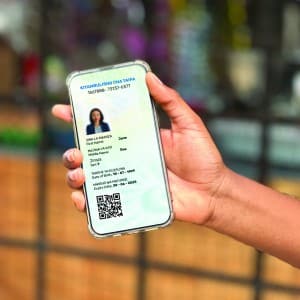Can Universal ID be an Enabler for Financial Inclusion and Economic Empowerment?
By Dr. Peter Kingu, Head of Policy, SME Development, and Inclusive Finance, at the Financial Sector Deepening Tanzania (FSDT)

National Identification Numbers (NINs) can provide citizens, especially underserved women and youth, with the opportunity to access services, such as finance, health and education. More specifically, NINs are key to financial inclusion and economic empowerment for all Tanzanians as they increase financial service providers’ ability to meet the Know-Your-Customer (KYC) criteria for opening accounts and providing credit. However, FinScope Tanzania 2023 findings show that only 57% of adult Tanzanians have NINs.
The low number of Tanzanians having NINs is one of the major obstacles to onboarding women and youth and their micro and small enterprises into formal financial services. Alarmingly, the number of younger adults below the age of 18 in possession of any form of identification is even less than that of older generations. This gap creates even more significant barriers to formal financial services, such as banking and insurance. Having access to formal banking services would give young Tanzanians a firmer footing on the path to economic productivity and improve their earning capacity. Given the 23% population growth over the last five years, the need to provide NINs for young people is more pressing now than ever. The need for Universal National ID is paramount and needs to be prioritized.
Universal ID dialogue gaining momentum
In August 2023, Tanzania’s NIN discourse gathered momentum as the Government highlighted the necessity for a Universal NIN, which should be issued from birth. Currently, the Registration and Identification of Persons Act (1986) only allows people to obtain a National ID from the age of 18. Therefore, this advancement will be an important step towards enabling all Tanzanians to access essential social and financial services right from birth.
FSDT has long recognized that people’s lack of identity documents is a key barrier to financial inclusion, and we have a history of working with the National Identification Authority (NIDA) to issue millions of NINs. FSDT has now renewed its collaboration with NIDA to discuss the introduction of the universal NIN from birth.
Opportunities in setting the stage for Universal ID
FSDT has identified several opportunities such as enhancing electronic ‘know-your-customer’ (e-KYC), Mobile Digital National Identification (m-ID), and National ID for All to enable the financial sector to tackle some of the challenges outlined above and facilitate an inclusive digital economy. FSDT will continue to work with the Government to improve the financial inclusion of women and youth farmers and MSMEs in Tanzania by convening key private and public sector stakeholders, sharing data and evidence, and facilitating policy dialogues to set the stage for the Universal ID. For these efforts to bear fruit, close collaboration and strategic partnerships will be required between financial service providers (FSPs), regulators, and policymakers.
Enhancing the use of e-KYC is key. FSPs can be encouraged to develop systems that integrate e-KYC for onboarding their customers. This would allow more women and youth to use NINs and eventually help more and more financially excluded and underserved women and youth, especially in rural areas, access and use financial services. FSDT is considering creating an industry guide to provide cost-effective strategies for FSPs to enhance e-KYC integration and optimize data-driven decisions. In addition to easing clients’ onboarding, e-KYC can improve FSP’s credit referencing and credit provisions to women and youth market segments.
Also of importance is promoting the use of Mobile Digital National Identification (m-ID). m-ID can fast track and enhance NIN issuance, especially for the tech-savvy “Generation Z” younger population. Globally, m-ID is still in its early stages, but FSDT is considering leveraging research and policy dialogues among key stakeholders, including mobile network operators, banks, fintechs, insurance companies, and the National Identification Authority (NIDA) to explore the potential of deploying the m-ID. This mobile solution would enable citizens to store, manage and share their data from different sources. Policy dialogues are expected to build a case on how m-ID can build on advanced technologies to streamline e-KYC verification and quicker service delivery. It would also be beneficial for Tanzania to also learn from other countries that are exploring the potential of m-ID. Earlier this year, the European Union kicked off its pilot for the EU Digital Identity Wallet. The pilot will test digital identity wallets in real-life scenarios across different sectors. More than 250 private companies and public authorities across 25 EU Member States and Norway, Iceland, and Ukraine will participate.
A final significant point to make is the promoting of National ID for All. Tanzania should fully embrace Universal National ID, and this would give rise to a need to review of the Registration and Identification of Persons Act (1986) to ensure that it includes access to national IDs to those below the ages of 18.
Future-proofing Tanzania
Ensuring all Tanzanians have a universal digital identification number from birth would increase people’s access to financial services, education, and health; and will enable Tanzania to position itself strongly to take advantage of the digital economy, where users can electronically access critical social and financial services. To ensure a successful Universal ID system is implemented in Tanzania from birth, there’s a need for a shared vision and coordinated efforts between the Government and private sector players in the areas of policies and use cases for the Universal ID.
Share your thoughts
What additional actions can Tanzania take to help ensure an effective implementation of the Universal ID, especially to improve financial inclusion and economic empowerment of women and youth?

